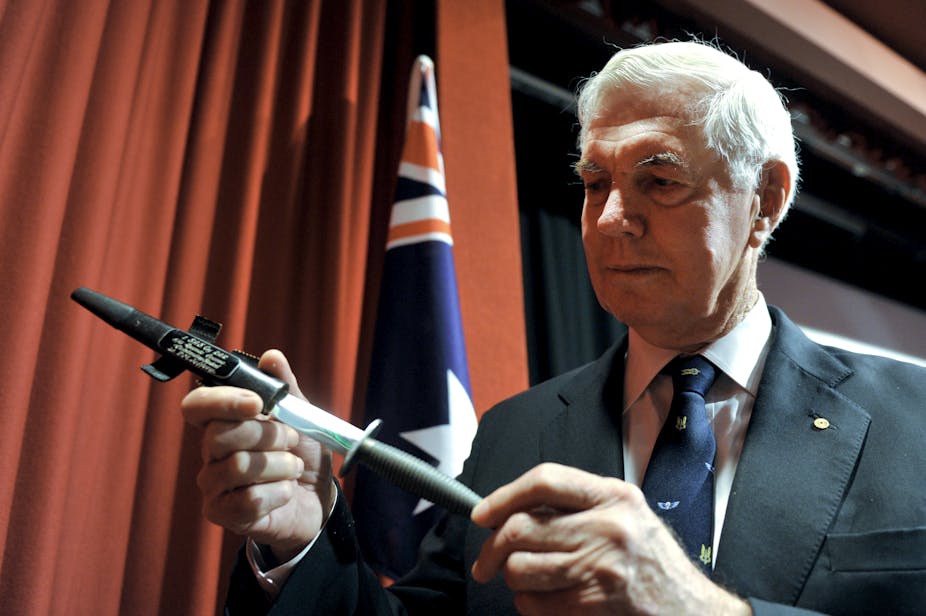A speech given by Major General Michael Jeffery at Victoria University College of Law and Justice on October 15 was the second of a series of four tapping into the vast experience of eminent Australians who have served as Governor-General of Australia.
In an uncommon approach to environmental issues, Major General Jeffery’s address urged the use of military planning processes to deliver more effective outcomes.
Drawing on almost 60 years of continuous military involvement and his passion for better and more sustainable land use, Major General Jeffery outlined the workings of the model to show how it could be adopted at a national decision-making level to tackle environmental challenges.
He warned that Australia faced serious and complex challenges associated with land degradation, unreliable rainfall and urban growth and voiced his concern that in 5 to 10 years global food and water scarcity would be the key drivers of military conflict and mass migration - the effect of which will be felt most by the world’s poorest communities.
Major General Jeffery’s full speech can be found here.
In response Helen Szoke, Chief Executive of Oxfam Australia, gave this speech of thanks.
Response from Helen Szoke
I want to commend you for your continued public service and particularly in the area that you’ve identified, in the area of global food and water crisis.
We have 105 million people who go to bed hungry every night, and if we don’t do something about climate change and the issue of food production, by 2050 we’ll have an additional 50 million people who will go to bed hungry. At the moment it’s one in nine people who go to bed hungry and 80% of those are people who are involved in food production.
So, I hope you keep your energy and commitment and focus because we need leaders in this field.
Oxfam has a lot of experience engaging with the military. As a humanitarian organisation we’re often in the same space. I had my first experience of seeing the military in action after Typhoon Haiyan in the Philippines and was able to see the benefits of that precision that is brought to situations. Many of you will remember the images of Tacloban. In that case it was the US marines who had taken over the running of the airport, which was the most incredibly, heavily-trafficked place.
We know that we benefit very much from the commitment that the military have to planning and precision. And it’s certainly a fascinating process that you outlined, in terms of some of the thinking, which you’ve applied to other areas of life.
By contrast, Oxfam’s history started by challenging a military strategy. This was a military strategy adopted by Winston Churchill in the Second World War. Oxfam started as the Oxfam Committee for Famine Relief, campaigning for food to be passed through a naval blockade to starving women and children in enemy-occupied Greece.
I want to also reflect on your comments about protection of the land. We know that there’s a bitter irony that the people who produce food, either here in Australia with the changing nature of agricultural businesses, and across the world, are often the ones worst affected by hunger and lack of access to resources.
We also heard about the competition for land, which is happening globally, and can have a whole lot of consequences that are often hidden from the general community. It can lead to human rights violations, illegal land grabs, and unethical land acquisitions. We see communities displaced, denied access to sacred sites and food crops as land is turned over to agriculture in which community considerations play little regard.
So the issue of food and protection of the land is absolutely crucial to looking at global issues, not just here in Australia but overall.
It’s estimated that a third of food produce is lost in the food system and this is another issue that we really have to face. In a world where so many people are hungry, there is so much waste. Waste often occurs because farmers lack access to resources or appropriate information to deal with food production; and in the domestic context face other challenges such as uncompetitive pricing and a real lack of regard for the critical role they play.
When I was invited to move this vote of thanks I was curious to know what the commonality might be in your own agenda and in the work we are doing at Oxfam and you’ve given me a happy coincidence, both to appreciate the work that you’re doing to understand the importance of these issues domestically, but also perhaps to give you an opportunity and insight into what one civil society organisation does in trying to do our bit to perhaps advance the similar agendas to you but in developing countries across the world.
I found your talk fascinating; I’m greatly appreciative of the opportunity to meet you and to move this vote of thanks and would ask everyone to join me in thanking the Honourable Michael Jeffery for his presentation.
The series continues next year and will feature The Honourable Dame Quentin Bryce AD CVO and His Excellency General the Honourable Sir Peter Cosgrove AK MC.

